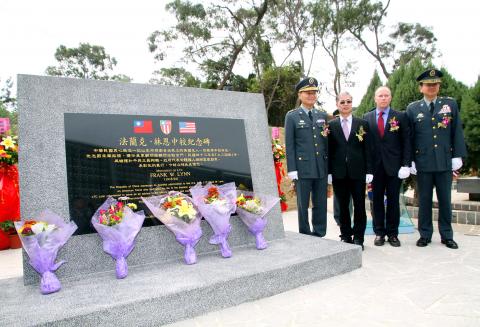The Kinmen Defense Command (KDC) unveiled a cenotaph on Tuesday to commemorate the late Lieutenant Colonel Frank Lynn of the US, who died in a Chinese artillery bombardment on Sept. 3, 1954, on Kinmen.
The monument was erected at Shueitou Wharf (水頭港) to mark the 57th anniversary of the attack and highlight the history of Taiwan-US friendship and the alliance that fought for democratic freedom, KDC officials said.
It was placed next to the cenotaph of Lieutenant Colonel Alfred Medendorp, which was installed at the wharf in August 1992. Medendorp was killed in the same bombing.

Photo: CNA
Aside from being an expression of gratitude, the cenotaphs are a reminder to future generations to treasure freedom and democracy and to help strengthen friendly relations between Taiwan and the US, said General Lee Hsiang-chou (李翔宙), who presided over the ceremony.
Chris Patton, a liaison officer at the American Institute in Taiwan, thanked Taiwan for constructing the monuments and saluting the officers for their sacrifice.
The cenotaphs are a witnesses to Taiwan’s role in maintaining peace in Asia and an emblem for fighters of peace, Patton said.
The cross-strait conflict of 1954 was an attempt by China to deter Taiwan from signing a bilateral security agreement with the US. The Chinese communists fired more than 100 artillery shells at Kinmen from military bases in Fujian Province.
KDC officials said the two Americans, who had volunteered to serve in Taiwan, sacrificed themselves for peace and justice, and their deaths indirectly hastened the signing of the Sino-American Mutual Defense Treaty between the Republic of China and the US in December 1954, which helped protect Taiwan from being invaded by China.
The treaty was terminated in 1980, a year after the US established diplomatic relations with China.

An essay competition jointly organized by a local writing society and a publisher affiliated with the Chinese Communist Party (CCP) might have contravened the Act Governing Relations Between the People of the Taiwan Area and the Mainland Area (臺灣地區與大陸地區人民關係條例), the Mainland Affairs Council (MAC) said on Thursday. “In this case, the partner organization is clearly an agency under the CCP’s Fujian Provincial Committee,” MAC Deputy Minister and spokesperson Liang Wen-chieh (梁文傑) said at a news briefing in Taipei. “It also involves bringing Taiwanese students to China with all-expenses-paid arrangements to attend award ceremonies and camps,” Liang said. Those two “characteristics” are typically sufficient

A magnitude 5.9 earthquake that struck about 33km off the coast of Hualien City was the "main shock" in a series of quakes in the area, with aftershocks expected over the next three days, the Central Weather Administration (CWA) said yesterday. Prior to the magnitude 5.9 quake shaking most of Taiwan at 6:53pm yesterday, six other earthquakes stronger than a magnitude of 4, starting with a magnitude 5.5 quake at 6:09pm, occurred in the area. CWA Seismological Center Director Wu Chien-fu (吳健富) confirmed that the quakes were all part of the same series and that the magnitude 5.5 temblor was

The brilliant blue waters, thick foliage and bucolic atmosphere on this seemingly idyllic archipelago deep in the Pacific Ocean belie the key role it now plays in a titanic geopolitical struggle. Palau is again on the front line as China, and the US and its allies prepare their forces in an intensifying contest for control over the Asia-Pacific region. The democratic nation of just 17,000 people hosts US-controlled airstrips and soon-to-be-completed radar installations that the US military describes as “critical” to monitoring vast swathes of water and airspace. It is also a key piece of the second island chain, a string of

The Central Weather Administration has issued a heat alert for southeastern Taiwan, warning of temperatures as high as 36°C today, while alerting some coastal areas of strong winds later in the day. Kaohsiung’s Neimen District (內門) and Pingtung County’s Neipu Township (內埔) are under an orange heat alert, which warns of temperatures as high as 36°C for three consecutive days, the CWA said, citing southwest winds. The heat would also extend to Tainan’s Nansi (楠西) and Yujing (玉井) districts, as well as Pingtung’s Gaoshu (高樹), Yanpu (鹽埔) and Majia (瑪家) townships, it said, forecasting highs of up to 36°C in those areas